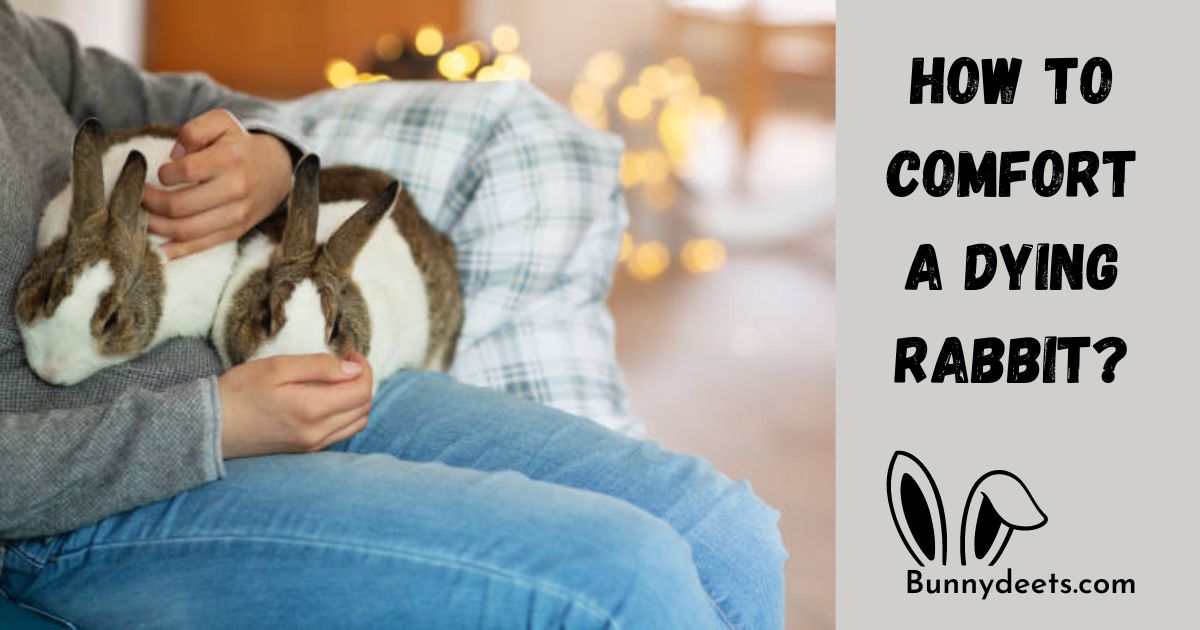Losing a beloved pet can be an incredibly challenging and emotional experience, and when it comes to a pet rabbit, the situation can be just as heartbreaking.
As bunny owners, it is our responsibility to provide love, care, and comfort to our furry friends, especially during their most vulnerable moments.
In this article, we’ll explore the sensitive topic of how to comfort a dying rabbit, offering guidance and support to help you and your bunny through this difficult time.
How to Comfort a Dying Rabbit?
1. Consult a Veterinarian
Start by consulting a veterinarian who specializes in rabbits. They can assess your rabbit’s condition, provide a diagnosis, and recommend appropriate care and pain management options.
2. Create a Quiet Space
Ensure your rabbit’s environment is calm and peaceful. Reduce noise and disturbances to minimize stress. Dimming the lights can create a soothing atmosphere.
3. Offer Gentle Physical Contact
Many rabbits find comfort in gentle strokes or being held close. Pay attention to your rabbit’s cues; if they seem uncomfortable with physical contact, respect their boundaries.
4. Keep Them Warm
Rabbits can struggle with temperature regulation when they’re unwell. Provide blankets or a heated pad to keep them warm, but be cautious not to overheat them.
5. Hydration is Key
Even if your rabbit has a reduced appetite, ensure they stay hydrated. Use a syringe or a shallow dish to offer water. Consult your vet for guidance on administering fluids if necessary.
6. Stay by Their Side
Your presence can be incredibly reassuring to your rabbit. Spend time near them, talking softly or reading a book. Your familiar voice can provide comfort.
7. Administer Pain Medications
Follow your vet’s recommendations for pain relief medications. These can significantly improve your rabbit’s quality of life and ease their discomfort.
8. Maintain a Clean Environment
Keep your rabbit’s living space clean to prevent infections. Soft bedding can help alleviate pressure sores and provide comfort.
9. Monitor for Signs of Pain
Pay close attention to your rabbit’s body language. Signs of pain, such as teeth grinding or restlessness, should be communicated to your vet for appropriate adjustments to their pain management plan.
10. Provide Emotional Support
Remember that this is a challenging time for you as well. Seek emotional support from friends, family, or support groups for pet owners to help you cope with the loss and provide the best care for your rabbit.
Understanding the Signs of a Dying Rabbit
| Signs of a Dying Rabbit | What to Observe |
| Decreased Appetite | A sudden loss of interest in food or water. |
| Lethargy | Your rabbit becomes unusually quiet and weak. |
| Difficulty Breathing | Labored or irregular breathing patterns. |
| Inactivity | Limited movement and reluctance to hop or explore. |
| Changes in Body Temperature | Feeling unusually warm or cold to the touch. |
| Loss of Weight | A noticeable drop in your rabbit's body weight. |
| Reduced Grooming | Neglecting self-grooming habits and fur appears unkempt. |
Coping with End-of-Life Decisions
As a responsible rabbit owner, you may face difficult decisions regarding your bunny’s end-of-life care. These decisions can be emotionally challenging but are necessary to ensure your rabbit’s well-being:
1. Euthanasia
When your rabbit’s suffering becomes unbearable, euthanasia may be a humane choice to end their pain and discomfort peacefully. Consult with your veterinarian to discuss the timing and process of euthanasia. They can guide you through this difficult decision.
2. Burial or Cremation
After your rabbit passes away, you’ll need to decide on their final resting place. You can choose between burial or cremation. If you decide on burial, ensure it complies with local regulations. Alternatively, consider cremation and keep your rabbit’s ashes as a cherished memento.
3. Grieving Process
Losing a beloved pet can be emotionally overwhelming. Allow yourself and your family to grieve. Share your feelings with loved ones, and consider creating a memorial or keepsake to honor your rabbit’s memory.
Factors That Cause Stress in Rabbits
1. Loud Noises
Rabbits are sensitive to noise. Loud sounds, such as shouting or construction work, can stress them out. Keep their living area quiet.
2. Changes in Routine
Rabbits thrive on routine. Sudden changes in feeding times or living arrangements can cause stress. Try to maintain a consistent schedule.
3. Predators or Aggressive Pets
The presence of predators or aggressive pets can terrify rabbits. Keep them in a secure and predator-proof enclosure to ensure their safety.
4. Illness or Injury
Rabbits are masters at hiding their pain, but underlying health issues can cause chronic stress. Regular veterinary check-ups can help detect and address these problems.
Avoiding Making Their Condition Worse
In the effort to comfort a dying rabbit, it’s crucial to avoid actions that could worsen its condition:
1. Avoid Force-Feeding
Force-feeding can cause distress and potentially harm your rabbit. Consult your vet for safe methods of nutritional support.
2. Don’t Overexert Them
Limit handling and activities that might tire your rabbit excessively. Allow them to rest and conserve their energy.
3. Keep Them Warm, Not Hot
While it’s essential to keep your rabbit warm, overheating can be harmful. Ensure their environment is at a comfortable temperature, and consult your vet for guidance.
4. Be Mindful of Medications
Follow your veterinarian’s instructions precisely when administering medications. Overdosing or mixing incompatible medications can be detrimental.
5. Monitor for Signs of Agitation
Pay attention to your rabbit’s body language. If they show signs of distress or discomfort, adjust your approach accordingly.

